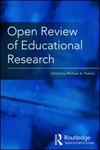What is ‘Human’ in Human Capital Theory? Marking a transition from industrial to postindustrial education
Q1 Arts and Humanities
引用次数: 12
Abstract
Abstract This article addresses educational practice as a site for the development of human capital theory. The article considers metaphysical constructions that are broadly typical of educational thought, and shows how they are amenable to economic analysis. Using different Marxist and feminist methods, it discusses pedagogy and the family as kinds of investment. The author questions the underlying assumptions about humanity on which both economics and education are predicated. If Western educators are certain of the historical ends to which modern Western education aims, do they also fully appreciate the implications of their own certainty and confidence for the future? As educators, are we equally confident that we question ourselves about why we uphold the value of education in the way each of us does? To engage educators in a debate about these values, the article employs poststructuralist critique to place words and concepts central to education and economics, e.g. the market, under erasure. It questions the way in which idealizations of teaching and learning are seen as forms of production and exchange. The article contests the notion of ‘humanity’ advanced within a postindustrial era, and seeks to open a more prescient account of knowledge as a form of wealth, and schooling as a form of commerce.人力资本理论中的“人”是什么?标志着从工业教育到后工业教育的转变
摘要本文将教育实践作为人力资本理论发展的场所。本文考虑了形而上学的结构,这是广泛的典型的教育思想,并表明他们是如何适应经济分析。运用不同的马克思主义和女性主义方法,探讨了教育和家庭作为一种投资。作者质疑经济学和教育所基于的关于人性的基本假设。如果西方教育家对现代西方教育所追求的历史目标深信不疑,那么他们是否也能充分认识到自己对未来的确定性和信心所蕴含的意义呢?作为教育工作者,我们是否同样有信心问自己,为什么我们每个人都以自己的方式坚持教育的价值?为了让教育工作者参与关于这些价值观的辩论,本文采用后结构主义批评,将教育和经济学的核心词汇和概念(例如市场)置于抹除之下。它质疑教学和学习的理想化被视为生产和交换形式的方式。这篇文章对在后工业时代发展起来的“人性”概念提出了质疑,并试图对知识作为一种财富形式、学校教育作为一种商业形式进行更有先见之明的阐述。
本文章由计算机程序翻译,如有差异,请以英文原文为准。
求助全文
约1分钟内获得全文
求助全文
来源期刊

Open Review of Educational Research
EDUCATION & EDUCATIONAL RESEARCH-
CiteScore
2.60
自引率
0.00%
发文量
0
审稿时长
22 weeks
 求助内容:
求助内容: 应助结果提醒方式:
应助结果提醒方式:


